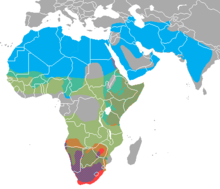Hyena
| Hyenas Temporal range: 26–0 Ma Early Miocene-recent |
|
|---|---|
 |
|
| All extant species of hyenas in descending order of size: spotted hyena, brown hyena, striped hyena and aardwolf. | |
| Scientific classification | |
| Kingdom: | Animalia |
| Phylum: | Chordata |
| Class: | Mammalia |
| Order: | Carnivora |
| Suborder: | Feliformia |
| Family: |
Hyaenidae Gray, 1821 |
| Genera | |
|
|
 |
|
| Synonyms | |
|
|
Hyenas or hyaenas (from Greek ὕαινα hýaina) are any feliform carnivoran mammals of the family Hyaenidae /haɪˈɛnᵻdiː/. With only four extant species, it is the fifth-smallest biological family in the Carnivora, and one of the smallest in the class Mammalia. Despite their low diversity, hyenas are unique and vital components of most African ecosystems.
Although phylogenetically they are closer to felines and viverrids, hyenas are behaviourally and morphologically similar to canines in several aspects; both hyenas and canines are non-arboreal, cursorial hunters that catch prey with their teeth rather than claws. Both eat food quickly and may store it, and their calloused feet with large, blunt, nonretractable nails are adapted for running and making sharp turns. However, the hyenas' grooming, scent marking, defecating habits, mating, and parental behaviour are consistent with the behaviour of other feliforms.
Spotted hyenas may kill as many as 95% of the animals they eat, while striped hyenas are largely scavengers. Generally, hyenas are known to drive off larger predators, like lions, from their kills, despite having a reputation in popular culture for being cowardly. Hyenas are primarily nocturnal animals, but sometimes venture from their lairs in the early-morning hours. With the exception of the highly social spotted hyena, hyenas are generally not gregarious animals, though they may live in family groups and congregate at kills.
...
Wikipedia
